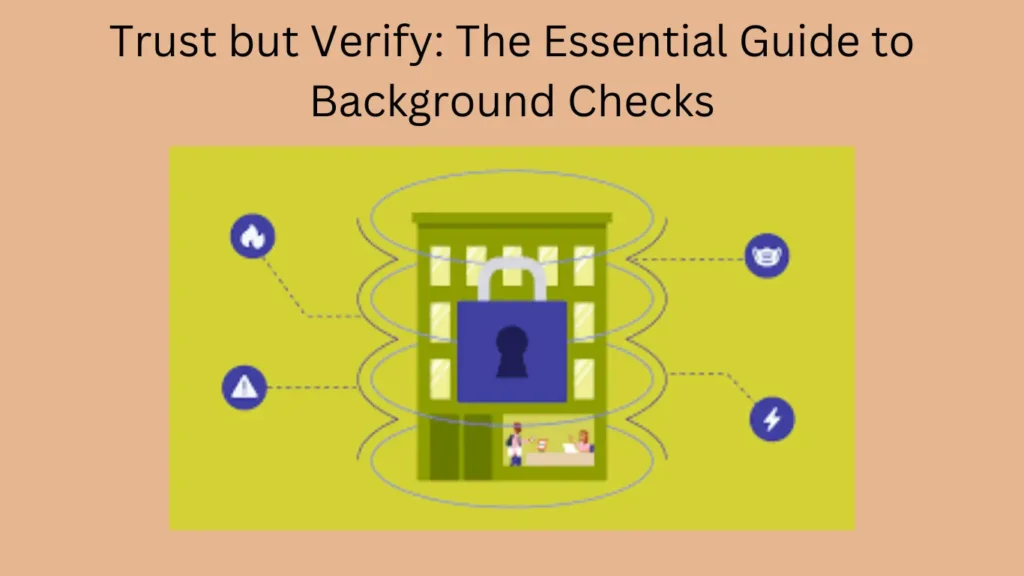Introduction
In today’s fast-paced world, ensuring the reliability and integrity of individuals, whether they are employees, tenants, or service providers, is crucial. Background checks play a pivotal role in this process, providing essential information that helps organizations and individuals make informed decisions. This guide will explore the importance of background checks, the various types, and how to conduct them effectively.
Why Are Background Checks Important?
1. Verifying Qualifications: They confirm that the information provided by an individual, such as educational qualifications and work experience, is accurate and truthful.
2. Protecting Assets: For businesses, background checks can prevent potential theft, fraud, and other financial crimes by ensuring that only trustworthy individuals are hired.
3. Legal Compliance: Many industries require background checks to comply with legal and regulatory standards, ensuring that the organization adheres to industry-specific guidelines.
Types of Background Checks
1. Identity Verification: This involves verifying the individual’s identity through government-issued documents such as a passport, driver’s license, or social security number.
2. Criminal Record Check: A criminal background check reveals any past criminal activities, helping to assess the individual’s potential risk.
3. Employment Verification: This process confirms the individual’s employment history, including job titles, responsibilities, and dates of employment.
4. Education Verification: Education verification ensures that the individual’s claimed educational qualifications are accurate and obtained from legitimate institutions.
5. Credit History Check: For positions involving financial responsibilities, a credit history check assesses the individual’s financial stability and responsibility.
6. Reference Checks: Reference checks provide insights into the individual’s character and work ethic by contacting previous employers or professional contacts.
7. Social Media Screening: Some organizations conduct social media screenings to gain additional insights into the individual’s behavior, interests, and personality.
How to Conduct Effective Background Checks
1. Maintain Transparency: Keep the individual informed about the background check process. Transparency builds trust and ensures they understand the scope and purpose of the checks.
2. Comply with Laws: Ensure that all background check activities comply with relevant laws and regulations, such as the Fair Credit Reporting Act (FCRA) in the United States.
3. Protect Privacy: Handle all information confidentially, store it securely, and ensure that it is only accessible to authorized personnel to protect the individual’s privacy.
4. Apply Consistent Standards: Apply the same background check standards to all candidates for a particular position to ensure fairness and avoid discrimination claims.
Best Practices for Background Checks
1. Develop a Clear Policy: Establish a clear background check policy that outlines the types of checks conducted, the process, and the criteria for decision-making.
2. Train Your Team: Ensure that your HR team is well-trained in conducting and interpreting background checks to make informed and fair decisions.
3. Regularly Review Practices: Regularly review and update your background check practices to ensure they remain compliant with changing laws and industry standards.
4. Use Technology: Leverage technology to streamline the background check process, making it faster and more efficient without compromising accuracy.
5. Address Discrepancies: When discrepancies arise, address them promptly and fairly. Give the individual an opportunity to explain or correct any errors.
Conclusion
Background checks are an essential tool for ensuring safety, verifying qualifications, protecting assets, and maintaining legal compliance. By following best practices and conducting thorough checks, organizations and individuals can make informed decisions that build trust and integrity.
For further Inquires Contact Us
FAQs
1. What is the purpose of a background check?
- Background checks help verify an individual’s identity, qualifications, and criminal history to ensure safety and trustworthiness.
2. How do I get consent for a background check?
- Obtain written consent from the individual, informing them of the scope and purpose of the background check.
3. What is included in a criminal record check?
- A criminal record check reveals any past criminal activities, helping assess the individual’s potential risk.
4. Why is employment verification important?
- Employment verification confirms the individual’s job history, ensuring their experience matches what they claim on their resume.
5. How can I ensure the privacy of background check information?
- Handle information confidentially, store it securely, and ensure it is only accessible to authorized personnel, complying with data protection regulations.
